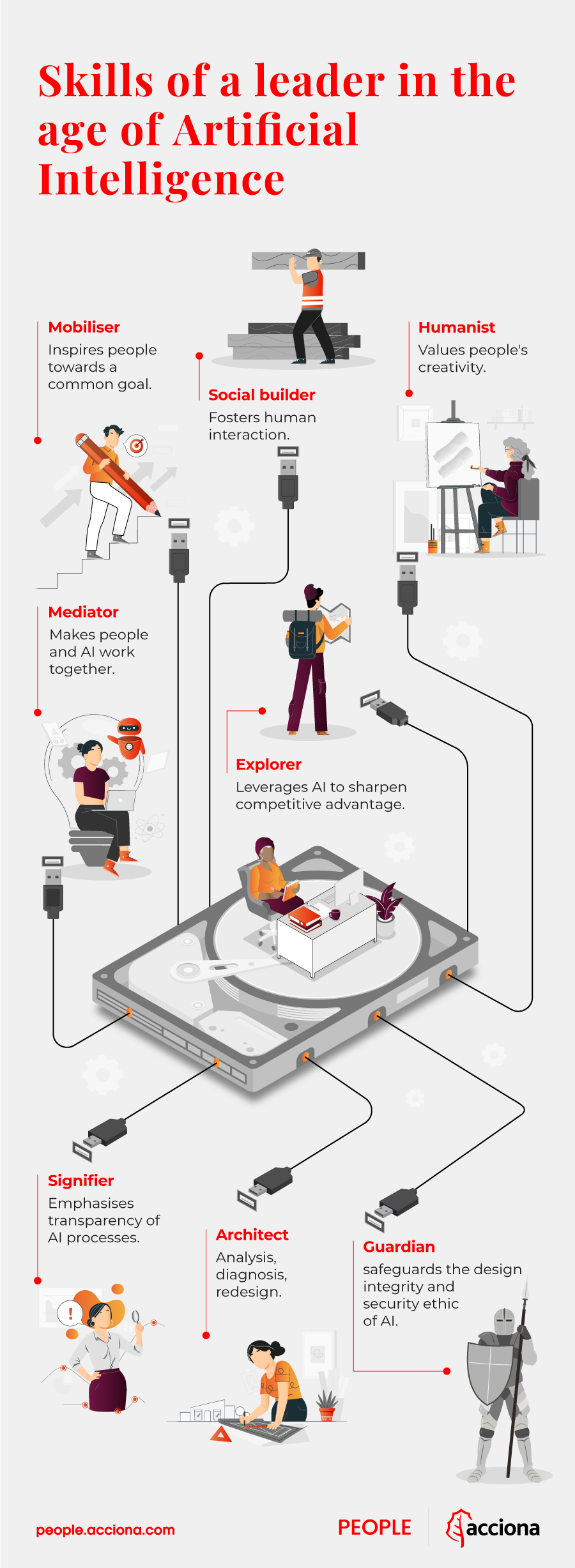In the wake of recent advances, Artificial Intelligence (AI) has gone from being an almost exclusive topic in technology departments to a focus that touches every aspect of society, so much so that it’s even capable of transforming the leadership of organisations. According to a recent McKinsey study, nearly a quarter of executives say they’re using AI tools to do their own work, and more than a quarter of respondents from companies using AI say the technology is already present on the executive board. Today we explore how to be a good leader in an AI-powered world.
What will I read about in this article?
- The figure of the leader in the age of Artificial Intelligence
- New intelligence requires new leadership
- Leader skills in the age of Artificial Intelligence
The figure of the leader in the age of Artificial Intelligence
To put it simply, we could say that Artificial Intelligence (AI) is the functioning of human intelligence simulated by machines. They process large amounts of data to find patterns and make predictions. It allows computers and different technological tools to learn, reason and make decisions like humans do, but at a scale and speed that is impossible for us to match.
It’s already increasingly seen as a fundamental algorithmic system for driving business growth and cannot be ignored to remain competitive and relevant. According to a PWC survey, 52% of companies accelerated their AI adoption plans in the last year.
How can today’s professionals navigate this complex and constantly evolving AI-driven world? The ability to adapt and evolve is critical for today’s business leader, who must navigate an environment increasingly influenced by Artificial Intelligence.
“The ability to adapt and evolve is fundamental for today’s business leader.”
We’re not saying you should become an expert overnight. As this Fast Company article points out, it is advisable to have a general understanding of what AI is, how it works and what its potential applications are within your organisation. It’s crucial to remember that it’s just another tool, not a substitute for people intelligence, so assess where and how it can add value, and make sure it aligns with the organisation’s goals and values.
New intelligence requires new leadership
The debate around AI requires a re-evaluation of leadership itself. Business problems and dilemmas cannot be solved by algorithms alone. Indeed, they can be accentuated by the use of these technologies. This is pointed out in this study by the consultancy firm Amrop, which provides some keys to understanding the figure of the leader in the world of Artificial Intelligence.
AI is particularly good at repetitive, routine tasks and thinking systematically. By implementing such systems for these types of occupations, companies can free employees to focus on higher-level tasks that require more critical thinking, which will add efficiency and productivity to the organisation.
This already implies that the tasks and jobs that AI is most likely to take over are the hard skills, and not so much the soft skills. In a way, this observation corresponds to what’s known as the Moravec’s paradox: what’s easy for humans is hard for AI, and what’s hard for humans seems quite easy for AI.

Within the AI environment, it seems that a good leader is able to recognise the enormous opportunities of its applications while emphasising human creativity. Perhaps the key is not to encourage competition against computers, but to try to develop the human qualities of the people in the team: creativity, discernment, fairness of judgement, social collaboration, etc. A way of working in which AI enhances the tasks of each professional.
“Moravec’s paradox postulates that what’s easy for humans is difficult for AI, and what’s difficult for humans seems quite easy for AI”.
People matter more than ever
The emotional and biased decision-making of the human brain has an advantage that the Amrop report highlights: the installation of moral and ethical principles that transcend calculative and utilitarian thinking.
A meaningful future requires corporate leadership to take responsibility for ensuring commercially effective progress while also taking into account a clear, broader and inspiring social purpose.
Humans have certain unique qualities that technology will never have (at least for now). While AI can do amazing things, it still lacks the emotional intelligence and creativity that people possess.
As pointed out in this Fast Company article, the leader must re-evaluate the skills that are important in an AI-driven workplace. For example, critical thinking, effective communication, adaptability to technology, and the ability to build and maintain relationships with others are human skills that will remain valuable and irreplaceable.
As leaders, we must also remember to maintain our own humanity and empathy, and not rely solely on algorithms to make decisions.
Leader skills in the age of Artificial Intelligence
AI-savvy leaders can facilitate innovation by embracing human-AI collaboration and transforming the workforce with new skills. According to Amrop’s research, a leader working with AI will be:
* Mobiliser: will inspire people to work together towards a common goal or objective.
* Social construct: will promote and protect the importance of human relationships and interactions as a means of learning and development.
* Humanistic: will value people skills such as creativity and empathy.
* Mediator: build bridges in the AI ecosystem to facilitate collaboration and efficiency both between people and between people and technology.
* Explorer: will use AI to sharpen competitive advantage, seeking new technologies and methods to improve organisational performance.
* Significant: will place particular emphasis on transparency and understanding of how AI systems are designed and operate. The leader will seek to ensure that everyone involved understands how these systems work, what their purpose is and how they can be used effectively and ethically.
* Architect: When we say that the leader will be an ‘architect’, we mean that they will need to take on a number of responsibilities essential to making the most of AI’s capabilities. They must be able to analyse and understand the data that AI provides, diagnose any problems or challenges that may arise, and be able to design solutions that leverage AI.
* Guardian: implies that the leader has the responsibility to protect and preserve the integrity of AI design and maintenance. This means that they must ensure that the AI is developed and used in an ethical, safe and effective manner.
Artificial Intelligence is transforming leadership in organisations, and it’s critical for today’s leaders to understand and adapt to this change. Not only does AI have the potential to increase efficiency and productivity, but it can also free employees to focus on tasks that require more critical thinking and unique human skills. Ultimately, in an increasingly AI-driven world, the role of the leader takes on a new dimension, highlighting the need to balance technology with humanity and ethics.



